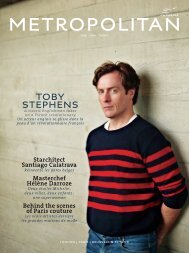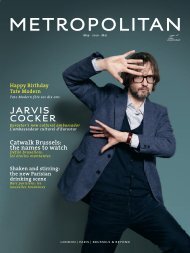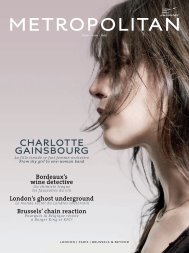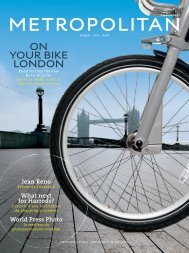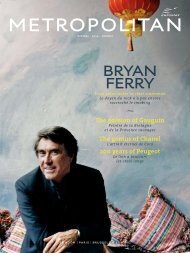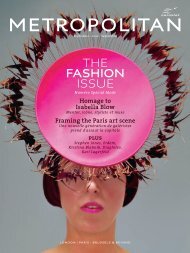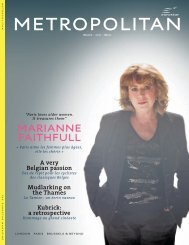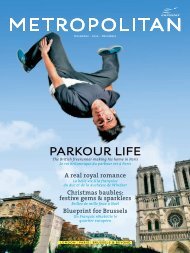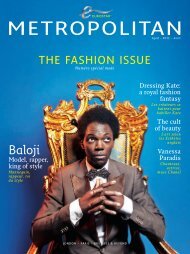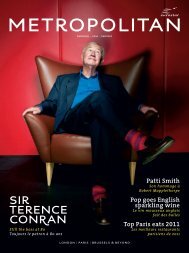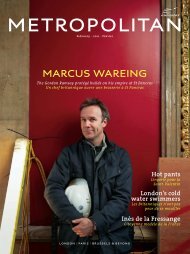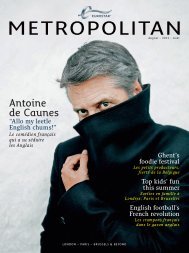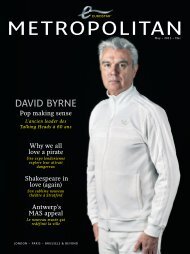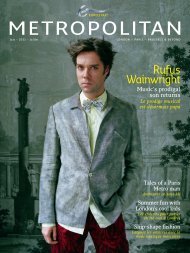november-2010
november-2010
november-2010
You also want an ePaper? Increase the reach of your titles
YUMPU automatically turns print PDFs into web optimized ePapers that Google loves.
got better with time. “I was probably gifted when<br />
I was younger, but I’ve worked very hard and<br />
improved a lot,” he says. “I hope so, at least. I had<br />
some feeling about improvisation in music, but<br />
I didn’t have this direction or technique yet. All<br />
of this came with years of practice.”<br />
American pianist-composer and post-bebopfunkster<br />
Herbie Hancock, who turned 70 this<br />
year, seconds that motion, suggesting his abilities<br />
have ripened with age and experience. “I don’t<br />
think so much now. My playing is a lot more<br />
intuitive. I trust myself more, I feel a lot freer.<br />
I don’t feel bound any more by any technical<br />
viewpoint. What I do now is a summation of<br />
everything I’ve experienced in the past.”<br />
The young Hancock spent the 1960s playing<br />
with Miles Davis in one of the most revered<br />
ensembles ever assembled – an early education<br />
in pushing boundaries. “The music was<br />
demanding, because the level of musicianship<br />
was so high. You need complete focus to play<br />
with a band like that. It wasn’t just Miles – all the<br />
guys in the band were superior musicians. I was<br />
23 when I joined Miles Davis’s band. I was a<br />
newcomer to avant-garde jazz. The great thing<br />
about Miles is he encouraged us to explore, to go<br />
past what you know into the unknown. He had<br />
a very open mind.”<br />
Hancock has kept exploring ever since,<br />
moving beyond jazz into funk, soul, hip-hop and<br />
electronic music, and working with musicians<br />
from Stevie Wonder to Leonard Cohen. Entering<br />
his eighth decade, he’s still excited to push his<br />
own limits. “Actually, I’m even more excited<br />
now,” he cackles. “It’s good to evolve.”<br />
French actress and singer Juliette Gréco, 83,<br />
knew Davis too, though their relationship was<br />
very different. “I met Miles Davis after a concert<br />
at the Salle Pleyel in Paris,” she tells me. “I didn’t<br />
have a penny to pay for a seat so I was backstage,<br />
watching from the wings, and there<br />
I caught a glimpse of Miles, in profi le: a real<br />
Giacometti, with a face of great beauty. There<br />
was such an unusual harmony between the<br />
man, the instrument and the sound – it was<br />
pretty shattering. Miles was a spectacle in<br />
himself. We were together a few months and<br />
kept in touch throughout his whole life.” She<br />
later became involved with another 20thcentury<br />
luminary, Serge Gainsbourg.<br />
Gréco’s early years were turbulent. During<br />
the war, her mother, an active member of the<br />
Resistance, was arrested by Gestapo offi cers.<br />
Juliette and her older sister fl ed but were also<br />
caught and imprisoned. Her mother and sister<br />
were sent to a prison camp (they were released in<br />
1945) but Juliette, only 16, was put out on to the<br />
92 METROPOLITAN<br />
streets of Paris. Alone and destitute, she was<br />
taken in by her French teacher who encouraged<br />
her to take up dance, drama and singing.<br />
She later attended Young Communists<br />
meetings and became part of the bohemian<br />
intellectual scene, spending time with the<br />
philosophers Sartre and Camus and the artists<br />
and musicians in the smoky clubs, cafés and<br />
cabarets of the Latin Quarter.<br />
It was out of this scene that she emerged, fi rst<br />
as an actress and a face on magazines, then as a<br />
singer. “I fell in love with jazz after the war,” she<br />
says. “And suddenly I had the opportunity to meet<br />
the greatest ones. I didn’t know they were ‘greats’:<br />
Charlie Parker, Dizzy Gillespie, Martial Solal, the<br />
Modern Jazz Quartet, Miles Davis… The most<br />
beautiful jazz music.<br />
“I was probably<br />
gifted when I was<br />
younger, but I’ve<br />
improved a lot”<br />
I’ve been so spoiled.”<br />
This era saw a<br />
cross-pollination<br />
of ideas, of music<br />
and art mixing<br />
with politics and<br />
philosophy. Gréco,<br />
for example,<br />
introduced John-Paul Sartre to Davis. “It was a<br />
very exciting time,” she adds. “It was very simple,<br />
very direct, very strong. You can call that ‘youth’.”<br />
Sixty years on, she has the same attitude as back<br />
then. “While I’m alive, I live – that’s all.”<br />
In her career, Dame Cleo Laine has collaborated<br />
with some 20th-century giants. The only woman<br />
to receive Grammy nominations in jazz, pop and<br />
classical categories, Laine’s career took off when<br />
she had a top 10 hit with You’ll Answer to Me<br />
in 1961, at the same time as she was appearing in<br />
Brecht and Weill’s The Seven Deadly Sins at the<br />
Edinburgh Festival. She has worked with everyone<br />
from Ray Charles and Frank Sinatra to James<br />
Galway, Nigel Kennedy and John Williams.<br />
Her closest and most enduring collaboration<br />
was with her husband, musician and composer<br />
Above:<br />
Herbie<br />
Hancock.<br />
Below:<br />
Juliette Gréco<br />
Ci-dessus :<br />
Herbie<br />
Hancock.<br />
Ci-dessous :<br />
Juliette Gréco<br />
Photography: Getty Images



